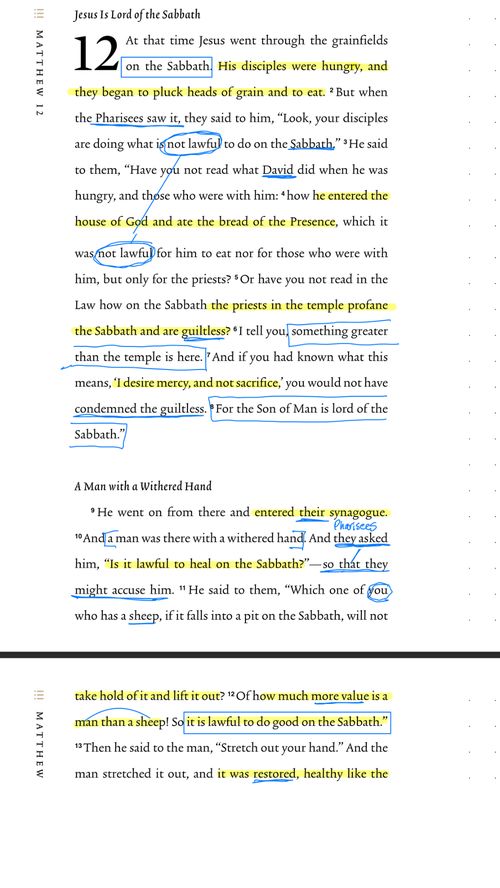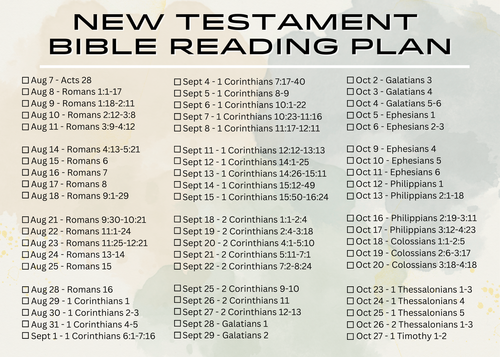The Lord of the Sabbath

“Then he began to denounce the cities where most of his mighty works had been done, because they did not repent. “Woe to you, Chorazin! Woe to you, Bethsaida! For if the mighty works done in you had been done in Tyre and Sidon, they would have repented long ago in sackcloth and ashes. But I tell you, it will be more bearable on the day of judgment for Tyre and Sidon than for you. And you, Capernaum, will you be exalted to heaven? You will be brought down to Hades. For if the mighty works done in you had been done in Sodom, it would have remained until this day. But I tell you that it will be more tolerable on the day of judgment for the land of Sodom than for you.” At that time Jesus declared, “I thank you, Father, Lord of heaven and earth, that you have hidden these things from the wise and understanding and revealed them to little children; yes, Father, for such was your gracious will. All things have been handed over to me by my Father, and no one knows the Son except the Father, and no one knows the Father except the Son and anyone to whom the Son chooses to reveal him. Come to me, all who labor and are heavy laden, and I will give you rest. Take my yoke upon you, and learn from me, for I am gentle and lowly in heart, and you will find rest for your souls. For my yoke is easy, and my burden is light.” At that time Jesus went through the grainfields on the Sabbath. His disciples were hungry, and they began to pluck heads of grain and to eat. But when the Pharisees saw it, they said to him, “Look, your disciples are doing what is not lawful to do on the Sabbath.” He said to them, “Have you not read what David did when he was hungry, and those who were with him: how he entered the house of God and ate the bread of the Presence, which it was not lawful for him to eat nor for those who were with him, but only for the priests? Or have you not read in the Law how on the Sabbath the priests in the temple profane the Sabbath and are guiltless? I tell you, something greater than the temple is here. And if you had known what this means, ‘I desire mercy, and not sacrifice,’ you would not have condemned the guiltless. For the Son of Man is lord of the Sabbath.” He went on from there and entered their synagogue. And a man was there with a withered hand. And they asked him, “Is it lawful to heal on the Sabbath?”—so that they might accuse him. He said to them, “Which one of you who has a sheep, if it falls into a pit on the Sabbath, will not take hold of it and lift it out? Of how much more value is a man than a sheep! So it is lawful to do good on the Sabbath.” Then he said to the man, “Stretch out your hand.” And the man stretched it out, and it was restored, healthy like the other. But the Pharisees went out and conspired against him, how to destroy him. Jesus, aware of this, withdrew from there. And many followed him, and he healed them all and ordered them not to make him known. This was to fulfill what was spoken by the prophet Isaiah: “Behold, my servant whom I have chosen, my beloved with whom my soul is well pleased. I will put my Spirit upon him, and he will proclaim justice to the Gentiles. He will not quarrel or cry aloud, nor will anyone hear his voice in the streets; a bruised reed he will not break, and a smoldering wick he will not quench, until he brings justice to victory; and in his name the Gentiles will hope.” (Matthew 11:20–12:21, ESV)
Mighty Works Ignored
Jesus pointedly warned three towns - Korazin, Bethsaida, and Capernaum. Jesus' divine miracles in these cities proved they were not without consequences and that He was the much-awaited Messiah. The people in these towns were not openly antagonistic but relatively unmoved and apathetic; this lack of response was sinful because they had seen the undeniable truth before them. As we learn more, we are held accountable to act accordingly. Jesus' bitter lament, "Woe," is a warning of impending judgment that carries with it the hope for redemption. Although He proclaims doom to those who don't repent, Jesus also gives them one more opportunity for salvation by reminding them that there's still time to turn away from their ways and towards Him. In other words, His stern yet loving proclamation urges repentance so that on the day of judgment, "it will be more bearable" (11:24).
Rest For The Soul
Jesus understands that people can be overwhelmed and offers rest for those weary and burdened. He invites us to take up his yoke, which is easy and the burden light (v. 30). The metaphor of a yoke is associated with agricultural life, where animals wear them to utilize their strength for plowing fields or carrying loads. When Jesus tells us, "Take my yoke," he's asking us to place it on our shoulders with trust as we learn from him, who has gentleness and humility. This does not mean discipleship lacks its challenges, but that following Jesus gives rest to the soul.
Lord Of The Sabbath
As Jesus and his disciples strolled along a winding path that crossed through a farmer's field on the Sabbath day, hunger began to take its toll. Undoubtedly noticing an abundance of ripe grains, they stopped to indulge in the bounty before them—stripping away any chaff as they popped them into their mouths. When the Pharisees noticed this, they immediately accosted Jesus: "Look! Your disciples are doing something unlawful on the Sabbath!" (Matt. 12:2). It was permissible for travelers to take grain off fields when hungry (Deut. 23:24-25). So what precisely were these men accused of?
The Pharisees were outraged that the disciples had broken three laws on the Sabbath; they plucked, reaped, and harvested grain. Additionally, when they rubbed it in their palms and blew to remove the chaff, they viewed this as threshing and winnowing. Breaking their Sabbath law, these actions appalled the Pharisees even more since it was one of the things that defined a Jew. To make matters worse, reaping—something explicitly forbidden on Saturdays—was among the prohibited activities.
In response to the Pharisees' accusation of Jesus violating Sabbath laws by allowing his disciples to eat, he inquires if they recall a significant moment in Israel's past and its specific connection to their accusations. When Jesus asks, "Haven't you read?" it is not to question the Pharisees reading capabilities. He recognizes they can grasp what's written in Scripture but they failed to understand its meaning. Jesus expects the Pharisees to understand his allusion to David's hunger and the fact that they unlawfully ate bread that had been set apart. The real question is—should they obey a man-made rule or provide sustenance to God's chosen servant? Jesus is Lord and establishes that the Sabbath is a day of mercy. Therefore, he defends his disciples twice over: mercy permits them to eat due to their hunger, and he is the Lord with authority to determine what the law means.
Do Good On The Sabbath
The Pharisees were so convinced that only life-threatening conditions warranted healing on the Sabbath that they developed a law around it. But when Jesus came into conflict with them again in the synagogue, their rule was defied and challenged by his willingness to heal. The Pharisees were ready with a trap when a man with a withered hand presented himself, and they asked him a question about what is lawful on the Sabbath. Jesus answers with a question of his own. Jesus reasoned that if people would go to the effort of rescuing animals, creatures with lesser value, when they have fallen into a pit on the Sabbath, then it is only proper and lawful for Him to heal a man on this holy day since men are more valuable. He declared emphatically, "It is lawful to do good on the Sabbath" (12:12). Without hesitation, Jesus proclaimed to the man: "Stretch out your hand." His hand was restored and healed perfectly as soon as he did so! The Pharisees were so upset that they began formulating a plan to take His life.
God's Servant
While the people perceive Jesus as a prophet and healer, they fail to realize his true identity. He is God's servant and the hope for all nations. Jesus commanded many of the people he healed not to make him known, but their gratitude was uncontrollable. This fulfilled what Isaiah wrote—through a Suffering Servant, redemption comes to his people.







Recent
Archive
2023
January
Happy New Year!He Will Save His People From Their SinsMy Beloved SonTemptation And MinistryThe SermonLeaving, Lying, Limits, Love, Largesse, and The Lord's PrayerTreasure, Anxiety, and JudgmentAstonishing AuthorityStorms, Demons, and HealingJesus Is CompassionateHis Eye Is On The SparrowSwords, Rewards, and MessengersThe Lord of the SabbathBlasphemy, Bad Trees, Signs, and FamilyStories, Sowers, and SoilsParables, Hidden Treasure, and RejectionFame, Food, Fear, Faith, and FringeReal Issues And The Power Of GodDying To Find LifeLike The SunChildren, Temptation, Sheep, And ForgivenessMarriage, Kids, And MoneyTo Serve And Give His Life
February
The ArrivalStories That StingQuestion TrapsHidden Motives And LamentThe End...?UnexpectedReady?Punishment, The Plot, And PerfumeTreachery, Passover, and The CupBetrayal, Injustice, And DenialThe Field Of Blood And The GovernorCrucifixion And DeathAll AuthorityMark—The Beginning Of The GospelHealing, Preaching, And The Forgiveness Of SinEating With Tax Collectors, Fasting, The Sabbath, And An Escape BoatThe Twelve, Blasphemy, Family, And A ParableParables And PowerA Different Kind Of StormPower Had Gone Out
March
Death, Hunger, And MiraclesCommandment Or TraditionDo You Not Yet Understand?The Christ And A Glimpse Of His GloryUnbelief, Confusion, And SinDivorce, Children, And PossessionsTo Give His Life As A RansomHosannaThe Rejected Stone, Taxes, And The Great CommandmentDestruction And The EndNo One Knows, An Anointing, And A Promise To BetrayPassover And GethsemaneThe Kiss, Arrest, And DenialPilate, Simon, And The CrucifixionDeath, Burial, Resurrection, And What\'s NextTheophilus And A Visit From GabrielMary And The MagnificatBenedictusThe Arrival And The ShepherdsSimeon, Anna, And The SpiritFruits Keeping With Repentance And BaptismThe Wilderness, Nazareth, And CapernaumSimon's Mother-In-Law, Fishing, A Leper, And Sins
April
Tax Collectors, Fasting, Sabbath Controversies, And The TwelveWhy Do You Call Me Lord, Lord?Jesus Marveled, A Raised Son, And QuestionsA Sinful Woman And A ParableObeying The Word, A Storm, And DemonsTwelve Years, Twelve Apostles, And SpeculationGreater, Costly, And GloryNot Getting It, The Cost, And AppointedWoes, Neighbors, And What Is NecessaryHelp Us Pray And A Divided Kingdom?Signs, Lights, And WoesHypocrisy, Fear, A Fool, And AnxietyParables, Division, And The TimesWarnings, A Daughter Of Abraham, And Jerusalem, JerusalemA Son Or An Ox, Parties, And DiscipleshipLost ThingsThe Dishonest Manager, The Law, And Anguish In This FlameMillstones And Mustard SeedsPersistent Prayer, Humility, A Childlike Faith, And The Rich RulerEverything That Is Written, A Blind Beggar, And A Wee Little Man
May
A Parable, A Colt, A Prophecy, And A CleansingAuthority, Wicked Tenants, And TaxesThings To Beware Of And WidowsDestruction, Persecution, The Son Of Man, And WatchingThe Plot, Betrayal, Lord's Supper, And Inappropriate BehaviorPrediction, Fulfillment, Agony, Betrayal, And DenialMistreated, Taken Before The Council, Pilate, Herod, And Delivered To Be CrucifiedCrucifixion, Death, And BurialHe Is Not HereDisbelieved For JoyIn The Beginning…The Lamb Of God And A WeddingZeal, What's Inside, And Born AgainHe Must Increase
Categories
no categories
Tags
no tags
